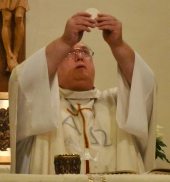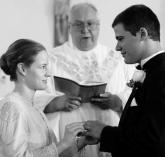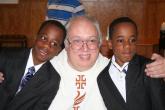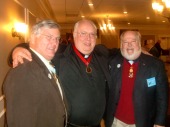 Dr. Kenneth Howell, an adjunct professor at the University of Illinois, Champaign, who taught classes on the Introduction to Catholicism and Modern Catholic Thought, was fired for teaching and explaining in an email to students the Catholic teaching on homosexuality. While the Catholic position is based upon the clear Scriptural prohibition, the meat or substance for our position is a reasoned stand applying Natural Law.
Dr. Kenneth Howell, an adjunct professor at the University of Illinois, Champaign, who taught classes on the Introduction to Catholicism and Modern Catholic Thought, was fired for teaching and explaining in an email to students the Catholic teaching on homosexuality. While the Catholic position is based upon the clear Scriptural prohibition, the meat or substance for our position is a reasoned stand applying Natural Law.
The universal catechism is very clear:
[CCC 2357] Homosexuality refers to relations between men or between women who experience an exclusive or predominant sexual attraction toward persons of the same sex. It has taken a great variety of forms through the centuries and in different cultures. Its psychological genesis remains largely unexplained. Basing itself on Sacred Scripture, which presents homosexual acts as acts of grave depravity, tradition has always declared that “homosexual acts are intrinsically disordered.” They are contrary to the natural law. They close the sexual act to the gift of life. They do not proceed from a genuine affective and sexual complementarity. Under no circumstances can they be approved.
The context of the current controversy was an upcoming test on the theory of utilitarianism. He contrasted it with the Catholic appreciation of natural law. Apparently, the university wanted him either to be silent regarding such Catholic teachings or to encourage dissent. Because he honestly taught what he was charged to teach, he was terminated. A friend of the student complained that the explanation he gave amounted to “hate speech.” This is precisely the kind of repercussion that we were told by liberals would not happen when legislation redefined such speech. Professor Howell has also suffered the loss of his position at the campus Catholic center. I suspect that the school will now seek out lapsed and/or bad Catholics to replace him. No “good” Catholic would take such a position since that school has unveiled its blatant anti-Catholic bias.
The professor wrote:
- In short, to judge an action wrong is not to condemn a person. A person and his/her acts can be distinguished for the purposes of morality.
- Natural Moral Law says that Morality must be a response to REALITY. In other words, sexual acts are only appropriate for people who are complementary, not the same.
- Men and women are complementary in their anatomy, physiology, and psychology. Men and women are not interchangeable. So, a moral sexual act has to be between persons that are fitted for that act. Consent is important but there is more than consent needed.
- One example applicable to homosexual acts illustrates the problem. To the best of my knowledge, in a sexual relationship between two men, one of them tends to act as the “woman” while the other acts as the “man.” In this scenario, homosexual men have been known to engage in certain types of actions for which their bodies are not fitted.
- I don’t want to be too graphic so I won’t go into details but a physician has told me that these acts are deleterious to the health of one or possibly both of the men. Yet, if the morality of the act is judged only by mutual consent, then there are clearly homosexual acts which are injurious to their health but which are consented to. Why are they injurious? Because they violate the meaning, structure, and (sometimes) health of the human body.
- Thus, people tend to think that we can use our bodies sexually in whatever ways we choose without regard to their actual structure and meaning. This is also what lies behind the idea of sex change operations. We can manipulate our bodies to be whatever we want them to be.
- Natural Moral Theory says that if we are to have healthy sexual lives, we must return to a connection between procreation and sex. Why? Because that is what is REAL. It is based on human sexual anatomy and physiology. Human sexuality is inherently unitive and procreative. If we encourage sexual relations that violate this basic meaning, we will end up denying something essential about our humanity, about our feminine and masculine nature.
- I know this doesn’t answer all the questions in many of your minds. All I ask as your teacher is that you approach these questions as a thinking adult. That implies questioning what you have heard around you. Unless you have done extensive research into homosexuality and are cognizant of the history of moral thought, you are not ready to make judgments about moral truth in this matter. All I encourage is to make informed decisions.
To read the complete email, go to: THE GAZETTE
This honest and good teacher taught for nine years at the University of Illinois. He told his students that they would be tested on their understanding of Catholic teaching, not judged upon their personal acceptance or beliefs.
The setting for the controversy was one of his lectures in the Introduction to Catholicism course. He wrote an email in May to his students in preparation for an exam regarding the application of natural law theory to a practical social issue, i.e. like judging the morality of homosexual acts. Despite acknowledging that many might disagree with Catholic doctrine, and the notion of natural law (like Supreme Court nominee, Elena Kagan), the good professor gave an accurate application to a pertinent issue from Catholic social teaching. Nevertheless, the school insisted that the teachings and email violated their standards of inclusivity.
Today, certain concerned administrators of the school have asked that the faculty committee determine whether or not academic freedom was violated. I suspect for many of us, even those unsympathetic to such views, would regard this as a no brainer. It seems obvious that a pro-homosexual litmus test usurped such freedom and an accurate, if offensive to some, Catholic teaching. Would he have also been fired for the application of natural law to the abortion question? Liberals hated Justice Clarence Thomas for his paper in such an application, drawing an analogy with the question of slavery and the violation of the innate dignity of human personhood.
It amazes me that a facility dedicated to open education could be so closed-minded. What are they saying to their students?
Truths are relative, unless they are liberal truths.
Judge no one but we can judge you.
All ideas are welcome, except those which are not politically correct.
Exercise your faith, unless you are a conservative Christian or Roman Catholic.
This professor was hired to teach Catholic thought. This university has not only wronged this man but sends the bigoted message that Catholic thinking is unacceptable on their campus. Perversion (my word, not that of the sensitive and gentle professor) is tolerated but no insinuation that such actions might be judged morally wrong. I suspect that this speaks ill both for the religious studies and the philosophy departments. If religious tenets and philosophical/ethical questions cannot be freely addressed, then any insistence of academic freedom becomes a hypocritical sham. Discussions about homosexuality, fornication, and abortion would be limited to the left or made taboo. The teacher gave a forthright answer. The students could have argued and disagreed with it. Instead, the professor was silenced. He attacked no one. He merely gave the Catholic position on a question of conduct.
Faithful Catholic students should complain that they are not really welcome to be fully engaged in the life of the school. Parents should consider sending their children elsewhere. I know one Catholic university which hired a renowned atheist philosophy instructor. The students and other faculty members often delighted in debating with him. They respected each other. But here is a case where a believer is punished precisely because he teaches views which non-believers or secular students will not tolerate. It is ironic that those who are the most fanatical about toleration are so often incredibly intolerant.
Dr. Kenneth Howell is an award winning educator (recognized by the university in 2009) and a convert to the Catholic faith. He has taught there for nine years. The word is out that even the local bishop is requesting his reinstatement. The professor was very careful to admit that he was a faithful practicing Catholic and thus he was sympathetic to the subject matter he was hired to teach. He slandered no one and even admitted that a critical eye to certain actions should not be interpreted as condemnation or hatred against others. Rather than a professional and academic debate, anonymous students and “politically correct” co-workers decided they would simply get rid of him. It reminds me of the spoiled child who takes his ball and runs home when he starts to lose in a game.
We are told that the university president, Michael Hogan, has received over 100 emails. Now he has asked that the matter be reviewed. Maybe more of us should say something about this as well?
UI President
uipres@uillinois.edu
http://www.uillinois.edu/president/
Executive Offices
http://www.uillinois.edu/administration/vps.cfm
Trustees
http://www.uillinois.edu/trustees/
Ethics Office
http://www.ethics.uillinois.edu/policies/index.cfm
My suggestion is that the professor be rehired or that the public school make it very clear that Catholic teachings are neither welcome in the classroom nor in regular discourse. If they do the latter, they should also forfeit tax dollars and public support. They can hang a sign on their doors, saying, “Catholics are only welcome if they shut up and compromise their faith and values!”
Further, if he is reinstated, I would recommend that those administrators, faculty members and students who violated his academic and personal rights face, themselves, some sort of disciplinary censure. They violated this man’s academic freedom, religious freedom and freedom of speech. Where he was open to rational discourse, they were not. He gave a coherent presentation of the subject matter he was charged to teach, Catholicism, without any foul language or attacks upon persons. Those who fired him were not so noble or magnanimous.
Is it not interesting that a liberal atheist professor at another university faced no reprimand when he urge the theft and desecration of the Eucharist while mockingly name-calling Christians and Catholics? However, when a Catholic professor who stresses respect for persons and freedom for intellectual inquiry, shares ideas which are found offensive by a radical minority over-sensitive about homosexual rights, he is quickly terminated.
Finally, I would urge other Catholic professors, students and those sensitive to matters of academic freedom, to take Dr. Howell’s email and to sign it themselves. At present, he is a man who stands largely alone. He did nothing wrong. This could be done online and with hard copies sent to the university. This should not be anonymous. That is the route of cowards, like the one who started this mess for the good professor. We should stand up and be counted.
We love our homosexual brothers and lesbian sisters.
However, Catholic teaching rightly stipulates that homosexual acts are disordered and a violation of our nature.
In any case, even if you disagree with Catholic teaching, given the public setting and the classes he was hired to teach, those who favor academic freedom should also support him.
DISCUSSION ON THIS POST
John
I heard about this on the radio the other day and could not believe it. Liberals are all about freedom of speech until you say something that they disagree with, and then they try to shut you down. Didn’t a professor out in CA teach a class on female masturbation with a [deleted]? I’m sure this was okay because of her freedom of speech. Simply amazing!
Ron D
I wrote the good UI President a three-letter email, “cut the crap.” Here is his reply, and mine:
Let me begin by thanking you for expressing your concerns. Academic freedom is at the core of our teaching and research missions. It’s vital to our ability to explore new ideas, educate our students, and promote the civil and free exchange of alternative viewpoints in a democracy.
I learned of this action on the University of Illinois Urbana-Champaign (UIUC) campus late last week and immediately asked Chancellor Robert Easter, who oversees the campus, to provide me with a briefing on the matter. I want to assure you that the University administration shares my commitment to the principles of academic freedom. At the same time, we do believe it’s important to fully investigate all of the details related to this situation. As I’m sure you’re aware, it is sometimes the case that public reports may convey only part of the story. I think it important to reserve judgment until I have all of the facts and I hope you’ll agree.
We have asked the UIUC Senate’s standing Committee on Academic Freedom and Tenure to immediately review this action. This is the mechanism on the campus through which these matters should be vetted. We expect this review to be completed very soon. By using our channels of shared governance and review, we are in the best position to make informed decisions that afford a fair process for all.
Again, I’m grateful to have heard from you and others about this and I’m grateful for the opportunity to respond. It reaffirms the deep commitment that so many have to the University and public higher education and to ensuring that the University of Illinois continues to be a beacon of excellence, as it should be for the state, the nation, and the world.
Sincerely,
Mike
Michael J. Hogan
President
University of Illinois
Just remember what he’s teaching. CATHOLIC studies. He cannot lie about the position of the Church, that wouldn’t be education. Many Catholics will be following this. I hope you come to the proper conclusion.
WI Catholic
This is why I have missed you!! God bless you abundantly!
Aidan H
Oh my goodness, you are back!
I thought you were dead!
And look, you raise your puffy fat head out of the grave fighting!
What is with you anyway? You must really hate gay people! You attack them and their rights every chance you get!
This screwy professor had to be fired. Like you he was a hate-monger. The university was crazy to allow Catholic nonsense to be taught at a state school anyway! It is a violation of church and state! If religion has to be taught, it should pass a litmus test. Groups and cults which encourage racism, sexism, and discrimination because of sexual orientation have no place in the public forum. They should be ostracized and stamped out.
If I had my way I would force the Catholic church to ordain women and active homosexuals. Guys who like other men and women would not be chasing little boys!
Did the professor explain how Catholicism can excuse and promote child abuse and the protection of molesters? I doubt it, but gay men who love each other are always fair game… NOT!
The natural law is bunk. We control our destinies and make what we want out of life. If same-sex love was unnatural then people would not have such attractions. But there are homosexual people and animals. It does not result in children but not all heterosexual relationships do so either.
If you ask me, celibacy is far more questionable than homosexuality. Is it even possible to go through life without the intimacy of another person and his or her body? It is no wonder these priests go bonkers and start chasing kiddies. They are sick men and this professor was an apologist for their sickness!
I for one am telling the university, “Bravo!” It was about time and I hope more such homophobic bigots are shown the door in the near future.
Father J, you are the most hateful and hypocritical priest I know. Just when I thought we would be spared your spewing lies, you jump back on the scene. I for one hope that your heart is racing. How’s the blood pressure? You can pop a vein but I bet you never [deleted]!
Now, here again is my dare. Show my comment or prove you are a coward and fake! You can give it, but by your own admission, you just can’t take it! I hope I am too much for you and that you will go away for good!
Why can’t you be like most priests, lazy fools who keep their mouths closed? Mind your own business and leave the rest of us alone.
Shut up! Shut up! Shut up!
Father Joe
Aidan, some comments are so radical that they are their own rebuttal.
Arguing with you will probably be pointless.
I will keep you in prayer, instead.
John
Father Joe, I was thinking the same thing while reading Aidan’s remarks: no sense in even responding to this. My blood pressure did start rising as I read, but by the time I was finished, I actually felt sad for this person. It sounds like he may be a little bigoted himself. You are right, we can only pray for them.
MQ
Kind words, your comment Father Joe, indeed kind words.
Jeff
Father Joe,
Just a quick word of encouragement for you, as a convert to Catholicism in 1987 (from a completely non-religious upbringing, btw), I admire reasoned thought in the defense of the Catholic Church’s teachings. God gave humans the ability to not only love, but also to reason and self-analyze. I believe that is strongest foundation by which we can stand firm in our faith and in our public defense of it.
Keep up the good work!
Lady Godless
Father Joe said: “Is it not interesting that a liberal atheist professor at another university faced no reprimand when he urge the theft and desecration of the Eucharist while mockingly name-calling Christians and Catholics? However, when a Catholic professor who stresses respect for persons and freedom for intellectual inquiry, shares ideas which are found offensive by a radical minority over-sensitive about homosexual rights, he is quickly terminated.”
Are you referring to PZ Myers?
I believe that was about something that happened a couple of years ago. What did you advocate in that case?
Father Joe
I do think there are extremes which would force censure upon professors: inappropriate relationships with students, incompetence, belligerence and seeking to harm the institution for which one is employed, treating students unfairly or unjustly (as in biased grading and verbal abuse), constant foul and derogatory language, encouraging students to violence, a disregard for the civil laws and enticing students to violate them, etc.
Myers ridiculed believers and lacked basic human respect. I would expect all teachers to exhibit a certain tolerance and courtesy to others, even when they do not share their opinions or views. Further, he was hired to teach science; Howell was specifically hired to teach about Roman Catholicism.
Howell might be critical of atheism, other religious beliefs, and the brand of morality practiced by others; however, he seemed honest and approached such issues within the scope of his course, respect for his students and intellectual honesty. A science teacher may or may not believe in God, and he might even share his intellectual reasoning for such views; however, name-calling and deliberate blasphemy crosses the line (in my estimation). It is like using the “n” word to blacks and the “f” word to homosexuals. Polite or decent people should not devalue others, even when there are serious disagreements, either from prejudice or from a given perspective of the created order.
Lady Godless
Looks like Ken Howell has been temporarily reinstated, pending full review:
http://articles.chicagotribune.com/2010-07-29/news/ct-met-u-of-i-catholic-professor-073020100729_1_reinstates-academic-freedom-associate-professor
Michele Johnson
I just discovered your blog, Father Joe. I find the discussions here fascinating but I can understand why you would need to limit your postings. The hatred in some of these comments is quite toxic.
What brought me to your blog was a search on how Catholics should react to Islam….which lead me to your article on Pope John Paul II kissing the Koran several years ago. Again, fascinating discussions and hoping I find some answers there.
I’ve recently been invited to attend a meeting to discuss a program for school children in our area. The program is “Operation Cooperation” and strives to bring understanding and cooperation among children of different faiths: Judaism, Catholicism, Islam and Christian Scientist.
I am praying for wisdom in this matter. I look forward to following your blog in the future.
May the Lord bless and keep you
Filed under: Anti-Catholicism, Catholic, Sexuality, Social Justice | Leave a comment »


















































